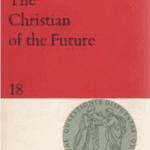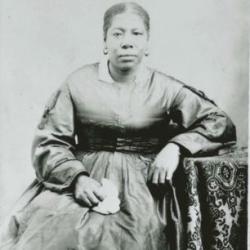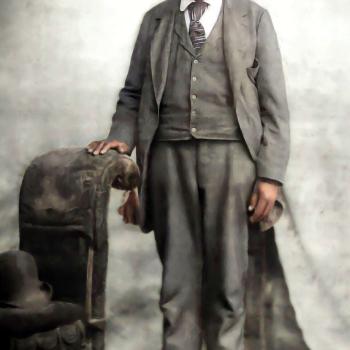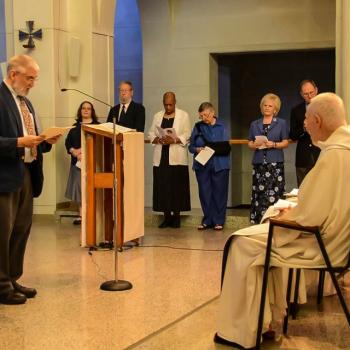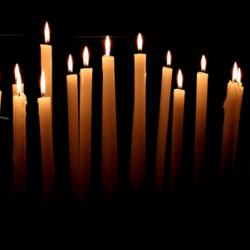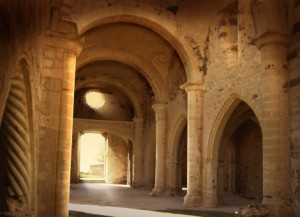
In his 1981 book Concern for the Church, Jesuit theologian Karl Rahner made his famous prediction, “the Christian of the future will be a mystic or he will not exist at all.”
A third of a century later, has Rahner’s prediction come to pass? The “not exist at all” part seems ominously real, as more and more congregations face declining membership, a shortage of priests, nuns, monks and volunteers, and difficulty raising enough money to pay for clergy salaries or building maintenance. But I think Rahner was trying to challenge followers of Jesus Christ to think outside the ecclesiastical box and envision new ways of spiritual living and faithful discipleship to re-shape our identity as Christians, both as individuals and as a Church.
With this in mind, I’d like to offer seven hopes that I have for the Christian — and Church — of the future. All of my hopes are grounded in scripture and Church tradition, so I’m not advocating any kind of major change for the faith, but simply a rediscovered commitment to the heart of the Gospel. By putting first things first, perhaps we can breathe new life into our shared faith.
Here’s what I hope, for the Christian (and Church) of the future:
- They will know we are Christians by our love — not our judgment. For far too long, Christianity has interacted with society at large mostly by denouncing what it is against. So it comes across as the “religion of no.” And while I think it’s important that we take a stand against corrosive sin (like human trafficking, for example), many of the “no-nos” seem both silly and sad: in my lifetime alone, at least some Christians have had public reputations largely defined by their opposition to movies, rock and roll, card games, the occult, cigarettes, alcohol, recreational drugs, gambling, sex, erotic art, divorce, humanism, feminism, homosexuality, birth control, Obamacare, liberalism — and the list could go on. And even if we agree that some of these things really are, or can be, sinful, why do we place so much more emphasis on what we are against rather than proclaiming all that we are for? And when we look at history and realize that Christians often were silent, or slow to speak up, about some obvious issues of injustice (such as slavery, Jim Crow laws, or domestic violence), the problem seems even worse. I hope that both individual Christians and the Church as a whole will get back on message: that our job is to proclaim God’s unconditional love, forgiveness and mercy — and when we set boundaries because of our faith, it’s always based in our commitment to Divine Love and the freedom of true justice.
- The Church will be a hospital for sinners, not a museum for saints. Abigail Van Buren made this point in 1964, but it’s still largely unrealized today. Our society judges others without mercy, and often refuses to acknowledge any possibility of rehabilitation. For example, sexual offenders are pariahs for life, regardless of how remorseful they are or whether they make positive efforts to amend their lives. By contrast, the teachings of Jesus flow with forgiveness. Jesus was 80% a healer and 20% a critic of sin, so Christians need to follow that example. We need to make healing and mercy central to our identity and practice. To facilitate this, we need to put less effort into creating and maintaining our “museums” — that is to say, our large, expensive buildings (not that there isn’t a place for art and beauty in worship — there is — but it needs to be in due proportion), and more of a focus on how we actively help people to make lasting, real, positive changes in their lives. Being a Christian is not a badge of honor, it’s a mark of humility. We need to be known for beauty, yes, but also for how we help each other out.
- The Church will take “the priesthood of all believers” seriously. I’m not enough of a theologian or ecclesiologist (is that a word?) to comment on the ministry of ordained priests and ministers; I suppose the Church will always have some sort of formal process for identifying and promoting its sacramental and liturgical leaders. That’s fine. But clericalism holds the Body of Christ back, so we need to take seriously the Biblical idea of the priesthood of all believers — the mark of our authority as Christians is baptism, not ordination. We will probably have fewer full-time clergy in the future, as the size and number of congregations continues to fall. Instead of paid pastors who do all the religious work while everyone else just watches, we need the Church to be a network of ministries, where everyone is empowered to bring Christ’s love, forgiveness and mercy into their life circumstances. Less hierarchy, more empowerment. We are all called to bring Christ to others, and to serve Christ in others.
- The Church will foster beauty and art, for to be a Christian is to be creative. We don’t all have to be Michelangelo or Mozart — but I believe the vast majority of people have untapped creative brilliance within them, and the Church is the best vehicle for helping to set our talents free. My hope is that the Church of the future will emphasize “the artistry of all believers,” helping each person to find his or her creative genius, and to nurture our abilities in both humble and magnificent ways. God is the source of all beauty, so faith ought to be about fostering beauty in our lives and relationships. Art takes many forms, and each artist is unique — and the local amateur who simply creates for love and joy is as important to the Body of Christ as the world famous musician or architect. We won’t spend as much money on our buildings, but they will still be havens of visual and musical splendor. Our witness to the world: God is a beautiful God, and faith is about generating loveliness in many ways and forms.
- The Church will finally figure out that Mary and Martha are sisters, so we need both action and contemplation. Christianity has always had its “Marthas” who work hard on outreach, social justice, and striving to build a better world; and its “Marys” who focus on prayer, meditation, contemplation, and fostering deeper intimacy with God. Sometimes this leads to fault lines in the Body — in our day, there seems to be a general division between “conservatives” who favor Mary and “progressives” who favor Martha. That’s a generalization, of course, but I run into it again and again — like the progressive Episcopal priest (now a bishop) who once told me, in a very Martha-like way, that he was “more of a practical person than a spiritual person.” But it’s a false dichotomy. Mary and Martha are sisters: they need each other. A healthy community of faith requires both the active and the contemplative dimension. Love of God and love of neighbor require each other to fully blossom. Ideally, every individual Christian will have both a “Mary side” and a “Martha side,” but it’s okay that there will always be “natural Marys” and “natural Marthas” (I myself am certainly a natural Mary). But the Church as a whole — even and especially at the neighborhood, parish/congregational level — needs to honor and affirm both sisters. Every faith community needs a contemplative and activist character. They complement each other.
- The Church will practice a contemplative model of leadership. “Contemplative leadership” emphasizes listening over arguing, wondering over demanding, patience over goal-setting, silence over shouting, service over domination, and prayer over politicking. Which is not to say there is no place for setting goals or debating difficult issues — of course such things will still take place. But they will emerge in the context of deep mindfulness, active compassion, a willingness to live in ambiguity and unknowing, and a recognition that sometimes the will of God comes to us in the most unlikely and humblest of ways. Contemplative leadership assumes that discerning the call of the Holy Spirit is an adventure that requires everyone’s participation. So everyone is invited to the dance.
- And yes, the Christian of the future will be a mystic — and will thrive. Back to Karl Rahner: I want to phrase his challenging statement more positively/hopefully. The Christian of the future will exist, even if with less social prestige or political clout than in the past. That’s okay, because our focus will not be on external status, but internal transformation. To be a Christians means to be joyfully in love with God, and Christ promised us union with God, which is the heart of mysticism. “Abide in me,” he instructed us. Ours will be a faith marked by joy and hope and love. And in a society increasingly focussed on competition and profit, on worshipping celebrities and ignoring the suffering of real human beings, Churches will be like fountains in the midst of the desert. Every church will teach its members how to pray, how to meditate, how to wait for God’s love in the silence of contemplative prayer, and how to practice the presence of God on a daily basis with love and confidence and a sense of quiet joy. Worship will be filled with joy, and older Christians will mentor younger Christians in silence and meaningful discernment. Churches will exist as havens of Divine Love, fostering in everyone, members and visitors alike, a sense of deep-wellbeing, grounded in an embodied sense of God’s love and mercy. We will feed each other, care for each other, love each other, and forgive each other. And then we will lavishly give our love away to the world at large.
So these are my hopes for the Christian of the future. Is there something you would add to this list? Please leave a comment below.
N.B. This article is inspired by a workshop I led on “The Christian of the Future” at St. Patrick’s Episcopal Church, Dunwoody, Georgia. I’d love to speak to your church or community. Visit my Booking Page for details.
Enjoy reading this blog?
Click here to become a patron.




